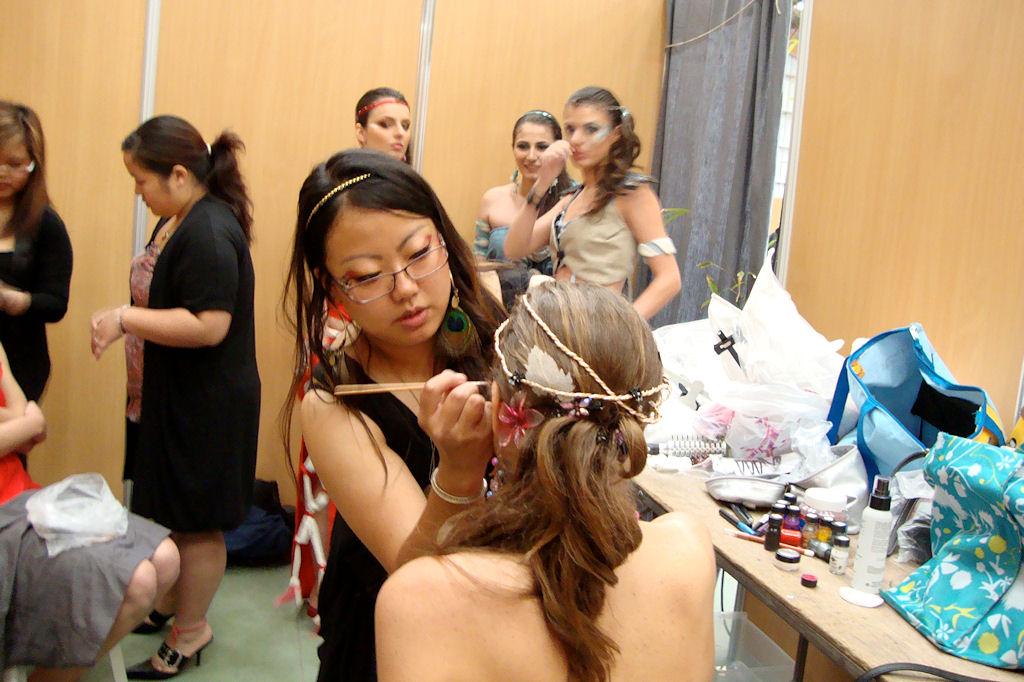Prize identifies fashion innovation in Paris’ suburbs
After winning the CiteStyle prize for budding fashion designers, Nuchi Xiong was asked to present looks in a linen industry fashion show in Le Neubourg, France on June 5, 2011.
LE NEUBOURG, France ― June in Normandy means fields of blue flax flowers, which are used to make linen. Here, where some of the world’s best linen is made, budding fashion designer Nuchi Xiong showed five outfits made from the fabric just a month after winning a fashion prize for original design called CiteStyle.
It’s not easy to break into the fashion industry, with many aspirants and few jobs, especially for those without connections. So CiteStyle was created last year to identify innovative designers in Paris’ downtrodden suburbs, who otherwise would remain “unexploited creative potential.” It is a partnership between Paris’ prestigious fashion school, ESMOD, and corporate sponsors Inditex France, JCDecaux and Institut Randstad.
Nuchi Xiong said winning the prize opened the door to her dream. The 25-year-old mother of two has no formal training. She is inspired by the fashion she sees on television and influenced by the native clothing her mother makes for festive occasions. Xiong’s parents moved to France from Laos in the 1970s and are part of the ethnic Hmong community. Hmong women are known for skillful needlework and colorful designs, which have sophisticated patterns and include accessories such as headbands or armbands.
“I think fashion in the [suburbs] is more original. We are more daring and add our personal touches to our designs,” said Xiong “I have a tendency to borrow things from our [Hmong] culture — bags, turbans or bits from costumes, using a mix of fabrics such as cotton, transparent tulle or organza.”
Organizers of the linen show discovered Xiong, who lives in Evreux, an hour from Paris by train, from press about her win. Although Xiong had never worked with linen before, her personal touches were evident on the designs she presented at her first fashion show. In just three weeks, Xiong came up with five outfits that are a mix of avant-garde and folklore, complete with ribbons, belts, headwear, decorative straps and blossoms made from linen that recall the blue flax flowers of Normandy.
Xiong said she had waited until her children were in school full time to launch her career. Now, in addition to receiving a 3,000 euro ($4,400) check as part of the CiteStyle prize, Xiong will see the urbanwear designs she presented to the jury become reality when Bershka, part of the giant Spanish group Inditex, which also owns Zara, produces and sells her clothing in France next fall. The proceeds from the sales will be donated to FACE (Fondation Agir Contre l’Exclusion), an organization that aims to prevent social exclusion via employment initiatives. Bershka targets the youth market and has sales of over 1.1 billion euros. It also has 600 stores in 42 countries, not yet including the United States.
Xiong will travel to Spain at the end of June to finalize her collection with Bershka designers, followed by 15 days of training at ESMOD in July.
Last year’s CiteStyle winner, Sabra Kerrouche, is from the Paris suburb of Aulnay-sous-Bois, which came to global attention during the civil riots in France in 2005. Kerrouche, whose parents are from Algeria, took inspiration from her mother, who was a seamstress. She began to sew out of boredom during school vacations, since her parents lacked the means to travel anywhere. She has since created her own label, Aul People (a play on words using “Aulnay” and the English word “all”), and held two fashion shows in Aulnay-sous-Bois using local high school dropouts as models.
Xiong spent part of her youth in Aulnay-sous-Bois and her mother still shops there for fabric. She met Kerrouche during the CiteStyle awards and said she was impressed by Kerrouche’s success and generosity. She would like to follow in Kerrouche’s footsteps by setting up her own business, but added that she is open to anything.
“My strategy is to start a small business via the internet, open shops in France and then abroad, to become a designer like Valentino or [Karl] Lagerfeld. You can’t have everything right away but it’s good to dream,” she said.
The Parisian world of fashion remains very difficult to break into, however, and without the right contacts it remains closed, said Sabra Kerrouche. “But that’s fine with me, I want to make it on my own.”
Xiong said her mother had originally dissuaded her from becoming a designer, warning her that it would be a difficult path, but “she was the one jumping for joy” when Xiong won her prize. Both Xiong and Kerrouche said their wins boosted their self-confidence.
Still, it hasn’t been easy, Kerrouche said. “I wasn’t expecting to be waited on hand and foot and everything I’ve done since winning the prize I’ve done on my own. Frankly, what young people in the [suburbs] need is money and motivation.”
Kerrouche dreams of opening a boutique in Paris, but says she simply doesn’t have the means. Randstad plans on giving her another 2,000 to 3,000 euros to boost her business plans, which include a website to sell her designs.
For the moment Xiong is basking in the success of her recent prize and the fashion show that it brought her. She is working on her designs for Bershka, which will include a padded jacket, sweater, pants, bag and scarf. Her clothing will be in wool and cotton and brightly colored “to add my personal touch.”
“Everything depends on your motivation and personality,” she said. “It’s up to us to how we present ourselves to people.”
Our coverage reaches millions each week, but only a small fraction of listeners contribute to sustain our program. We still need 224 more people to donate $100 or $10/monthly to unlock our $67,000 match. Will you help us get there today?
